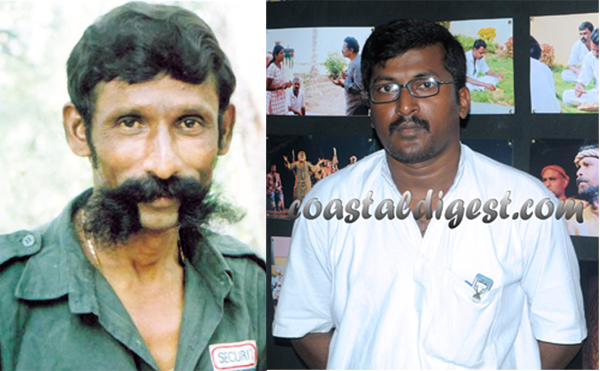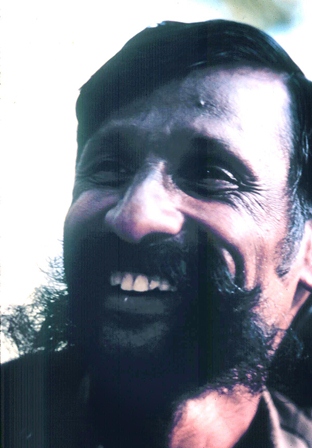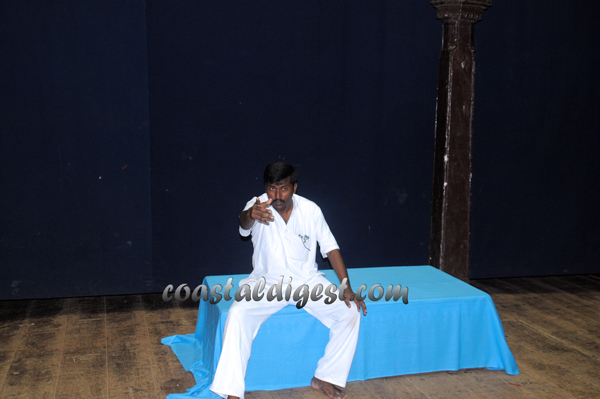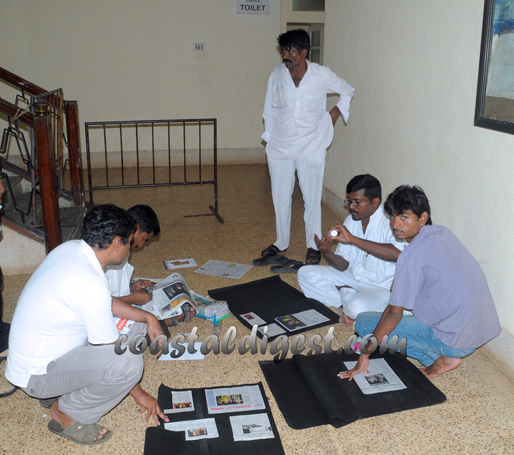
Mangalore, July 4: He is one of the many convicts who are in Mangalore to perform on stage in the ‘Jailininda Jailige Rangayatre’ programme being held at Town Hall in the city. Like most of his jail mates, he wants release and is looking forward to living a life of dignity in the remainder of his life. And, so did the once dreaded brigand Veerappan, says Amburaj, with whom he spent six months as an accomplice.
“From what I saw in the time I spent with him, he had this wish to live a life of dignity and spend his last days as just another citizen with peace”, says Amburaj. “He would kidnap people only to pressurize the government to allow him to live like a common man. I was with him when he kidnapped nine forest officers near Gundal dam. On that occasion too, his demand was the same. He would convey a message to the government that he is ready to lay down arms and be jailed provided he is put behind bars for a specified period of time of say five years or 10 years and then be released so that he could live the rest of his life as just another citizen. I was not with him when he kidnapped Dr. Rajkumar, but I am sure the intention behind that kidnapping would also have been the same”, Amburaj reveals.

Amburaj, who hails from Periyar district of Tamil Nadu says his meeting with Veerappan was accidental. “I had this habit of roaming around in forests just to enjoy the beauty of nature, especially during school holidays. I met Veerappan in the year 1997. I was a teenager, and so were my brothers who had accompanied me to the forests. Deep in the jungle, we saw men in uniforms with guns and we thought they might be members of the STF who were rather strict in terms of human activity in the forests. On the other hand, Veerappan’s men thought we are informers of STF and caught us. They produced me and my brothers before Veerappan. I remember he spoke to us and we told him why we had come to the forest. He then asked us if we could help him get ration and food grains and spoke in a threatening tone. We agreed and started arranging ration for him and his men. That is how our association with him began”, he recalls.
During his six month stay with Veerappan, says Amburaj, he saw the various sides of the brigand’s personality. “He would carry out his daily prayers and poojas with great devotion. He was a criminal without doubt, but there was this other side to him too. From what I observed in my six month stay with him, he came across as a man who had grown up in a criminal atmosphere. He had access to guns very early in his life as in those days people living around forest areas would keep guns for safety. They say he misused guns right from the beginning. It appeared to me that solving matters with talks and consultations was something alien to him and he had only been settling matters through weapons and killings”, says Amburaj.
Amburaj said he had had enough of Veerappan’s company and requested him to allow him to go back home. “He had told us that he would be keeping us with him for two weeks or so but even after months passing by he had kept us with him. Finally he told us that he will let us go. He told us that if we left the forest without any company, we could be targeted by the police and advised us to go with media persons. He would communicate with media persons of ‘Netrikan’ newspaper and in 1998, me and my brothers in the company of media persons came out of forests. We surrendered ourselves before the police. We told the cops that we worked for Veerappan under pressure and threat but in spite of all our appeals and explanations, we were sentenced to life imprisonment. The authorities argued that had we not provided ration to Veerappan he would not have carried out his criminal activities at all”, discloses Amburaj.
The arrest of Amburaj and his brothers came as a shock to his family members. “They had no idea that we were working for Veerappan. In fact, they had registered a missing complaint with the police. They were worried. Only when the news broke out that we had surrendered before the police did they actually come to know that we are still alive. I miss my family. We come from an agricultural family. We have no criminal background in our family whatsoever. My father has been pained deeply over what has happened. He comes to see me in jail” reveals Amburaj who spends his days in the lock up of Mysore Central Jail as Convict No. 14865.
But the theatre tour has come as a pleasant change in his life, says Amburaj who impressed the audience with his acting skills in his role as the King of France in the Shakespearan play ‘King Lear’ staged on the opening day of the four day theatre fest in Mangalore. “If not for Kattimani sir (Hulugappa Kattimani of Rangayana, who is organizing the theatre fest), we would have been mentally ill by now. In the four walls of the jail, we were getting into depression. These play performances give us an outlet to express our pent up feelings and energy. Life in jail was different before this. We were all like roaming dead bodies. About 40-50 people would sleep in one cell but we hardly knew each other’s names and hardly spoke to each other. The first thing Kattimani sir did was to make us express our feelings and share our stories with each other. Now, life in jail is different. The performances, the response of the audiences, the different people we meet and speak to, all these moments run like scenes before our eyes once we are locked up again and they keep us charged and positive for the rest of the year”, says he.

Amburaj playing the King of France in 'King Lear'


Photos by Ahmed Anwar






Comments
Add new comment